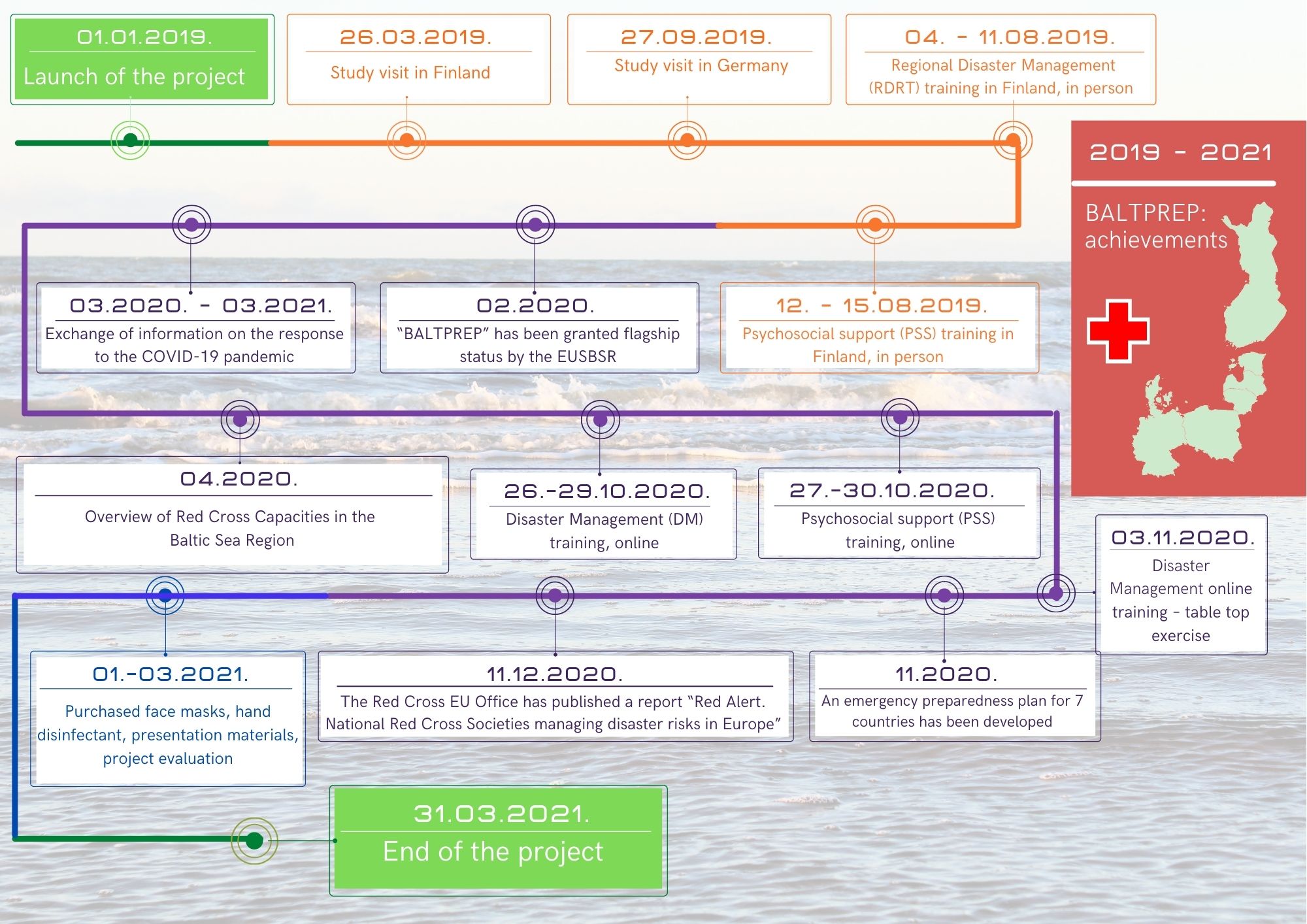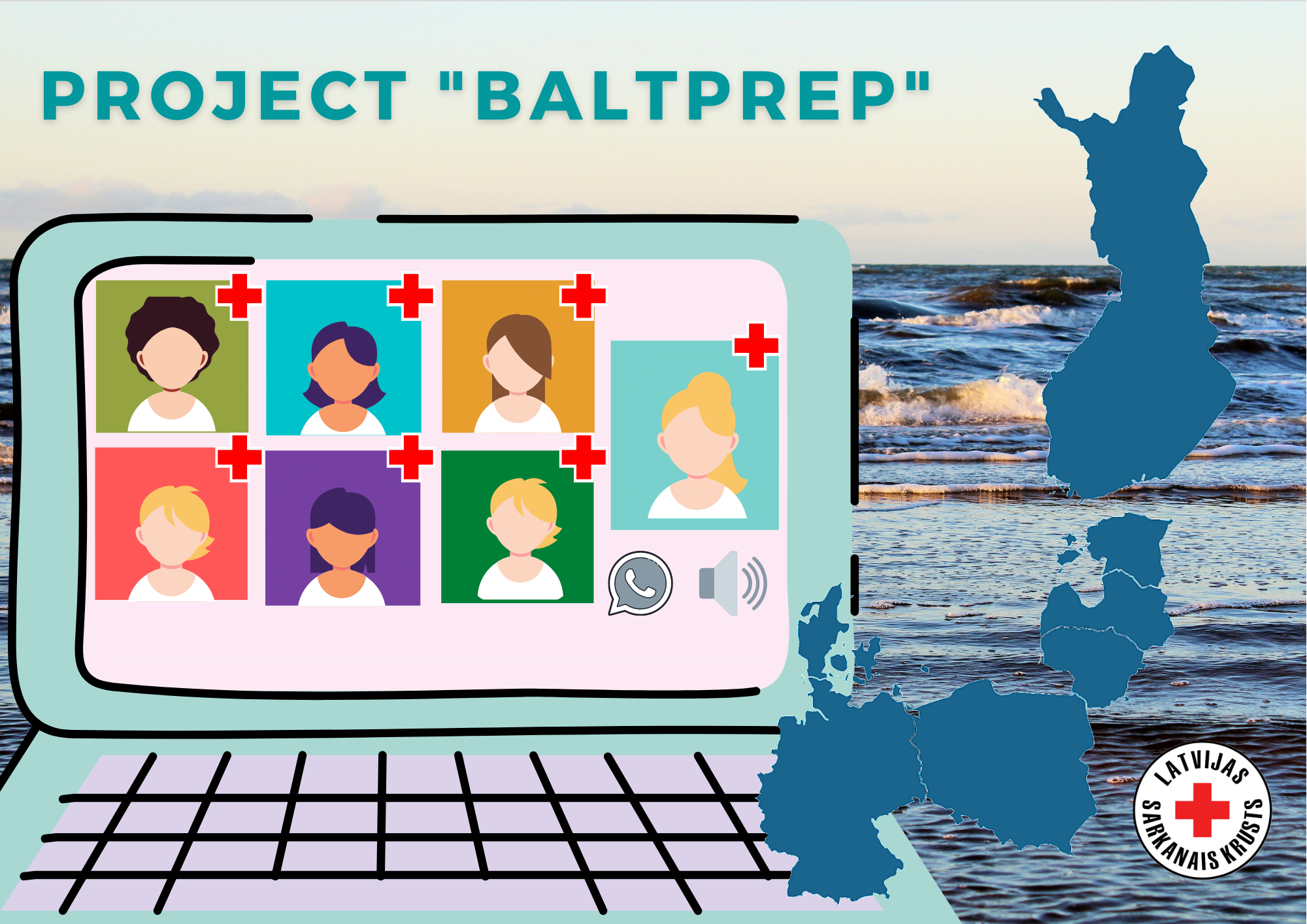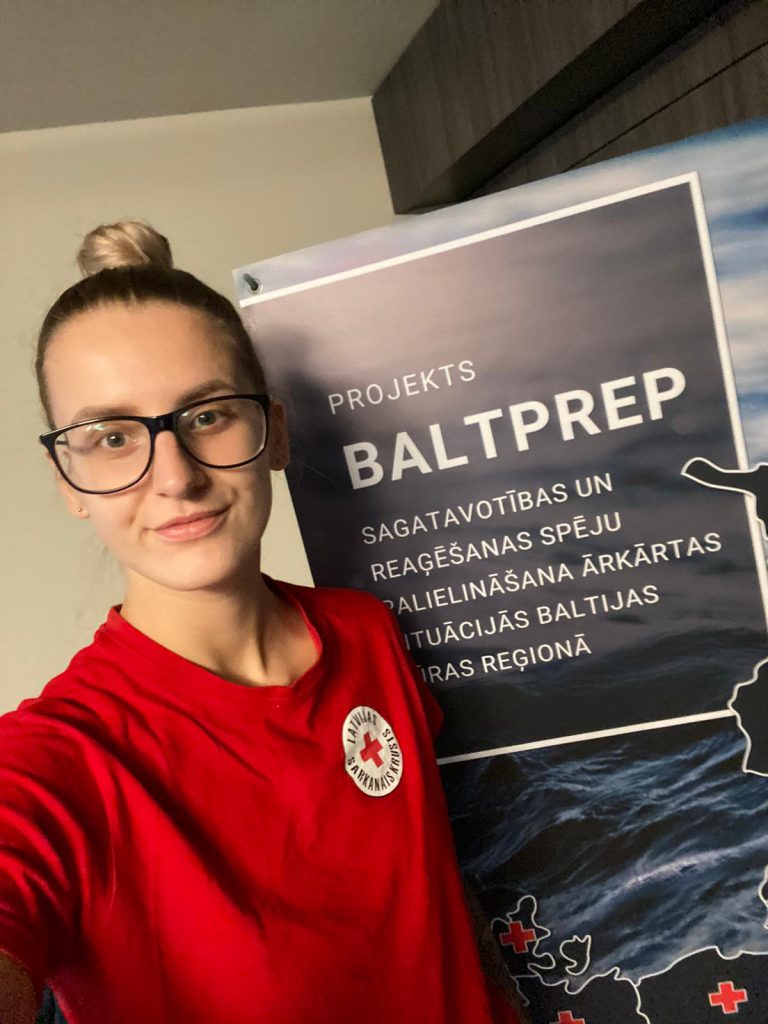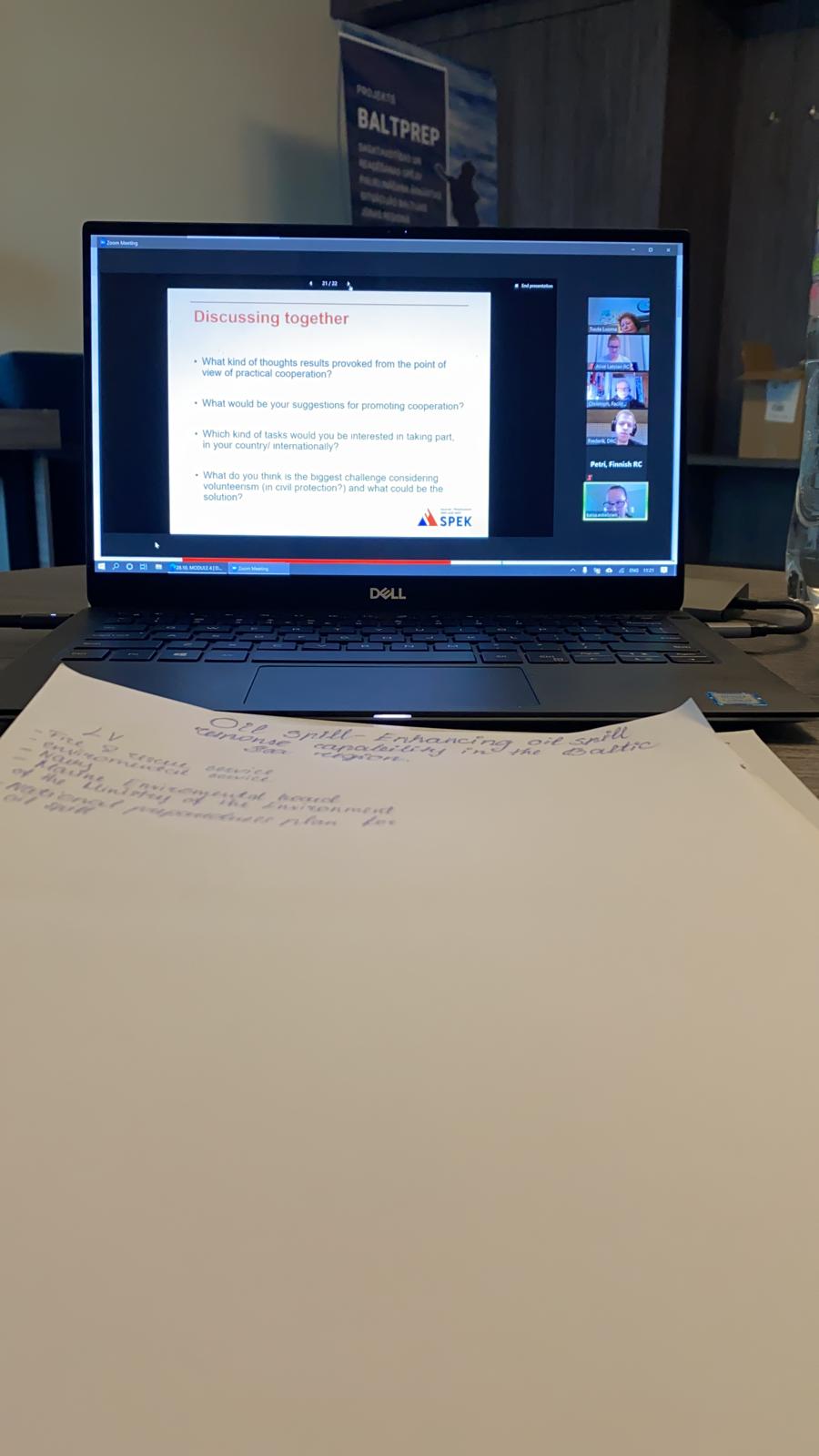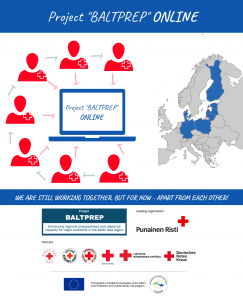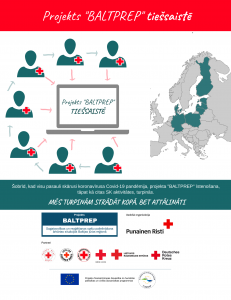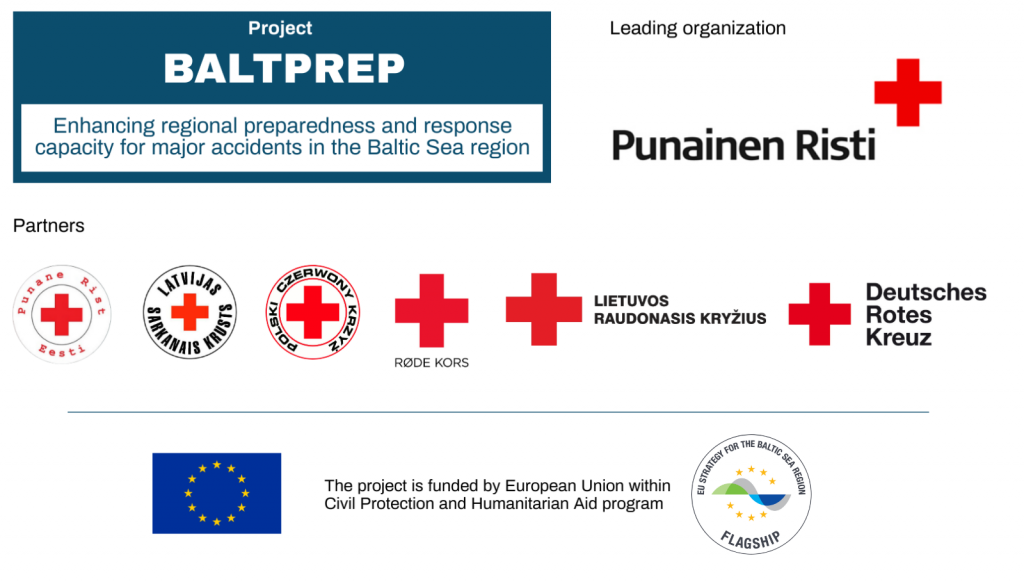
Project implementation period: 1 January, 2019 – 31 March, 2021
Project No: 826529
Project partners, 7 EU member states in Baltic Sea macro-region: Finnish Red Cross (leading organization), Danish Red Cross, Estonian Red Cross, Latvian Red Cross, Lithuanian Red Cross, Polish Red Cross, German Red Cross. Russian and Swedish Red Cross are invited to participate in the implementation process.
The general objective: to improve and optimize quality and interoperability of the Red Cross and Civil Protection Authorities regional response capacity for major accidents and severe disruptions.
The project is implemented in: Finland, Denmark, Germany, Poland, Lithuania, Latvia and Estonia.
Context & overall objectives
The Baltic Sea region (BSR) covers a significant area of northern Europe and its EU member countries representing nearly a fifth of the EU population. Over the past few years, issues of preparedness have emerged strongly in the region. The BALTPREP – Enhancing regional preparedness and response capacity for major accidents in the Baltic Sea region project improves and optimizes quality and interoperability of the Red Cross and Civil Protection Authorities regional response capacity for major accidents and severe disruptions. The project strengthens collaboration in and between 7 EU member states: Finland, Denmark, Germany, Poland, Lithuania, Latvia and Estonia.
Work planned & main achievements
BALTPREP includes wide range of activities in the field of regional preparedness. By the end of the project, the participating countries will benefit from a better understanding of existing response capacities and assets around the region, more trained staff and volunteers, and importantly, a solid sub-regional framework for preparedness by established working groups (i.e. DM-TWG) and preparedness planning to ensure sustainability. At the end of the project, the regional response capacities are tested in a table-top exercise to capture findings and lessons learnt for further regional development.
Results & impacts
As result of BALTPREP, capacities and interoperability in Psychosocial Support (PSS) in emergencies will be increased, co-operation between civil protection and humanitarian aid actors will be enhanced and trans-border and macro regional co-operation will be improved. The activities take place in participating countries. The project involves staff, volunteers and international aid workers from each RCNS in addition to the Civil Protection Authorities. Civil Protection Authorities, communities and the Red Cross National Societies in participating countries benefit from improved coordination, quality and interoperability of existing response capacities and more efficient and standardized assistance in case of an emergency.
The project is funded by European Union within Civil Protection and Humanitarian Aid program. Budget: 0,6M EUR (75 % EU Contribution, 25% funded by Red Cross national societies).
Project Manager for the Latvian Red Cross is Ms. Agnese Trofimova, for more information, please contact her by e-mail: agnese.trofimova@redcross.lv or by phone: + 371 67686312.
Project “BALTPREP” table of achievements is found HERE!
The evaluation of the project “BALTPREP” has been successfully completed
Published 26.03.2021.
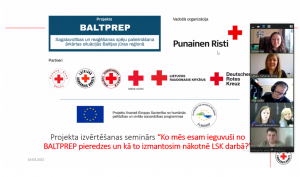
On March 19, an online evaluation meeting of the international project “BALTPREP – enhancing regional preparedness and response capacity for major accidents in the Baltic Sea region” took place, which was attended by the project management group from the Latvian Red Cross (LatRC), as well as its staff and volunteers who participated in international trainings on emergency response and psychosocial support that were held in 2019 and 2020.
The participants were introduced to Guidelines of Disaster Management and Psychosocial Support trainings. They also reviewed other activities implemented and the results achieved during the project.
The participants shared their experience of gaining new knowledge within international trainings. In 2019, they took place in Finland and in 2020, due to Covid-19 travel restrictions, they were organized online. During the meeting, these trainings were evaluated – the methods used, the theoretical basis provided, practical tasks, advantages and disadvantages of face-to-face and online learning experiences.
As a result of the exchange of opinions and experience, recommendations for further development of the LatRC in the field of emergencies were developed. During the discussions, the inclusion of psychosocial support in the LatRC First Aid and Emergency Program also received a positive support. The topics of psychosocial support and psychological first aid were assessed as valuable in order to include them as one of the main topics in the development and implementation of local and international LatRC projects in the future. The developed recommendations were based on objective findings and practical experience gained during the project, and on evaluation of challanges and ideas that can be successfully integrated into the activities of the LatRC.
The LatR has been implementing activities within the project “BALTPREP” for two years, while actively cooperating with the Red Cross national societies in Baltic Sea region – Finland, Estonia, Lithuania, Poland, Germany and Denmark. Representatives of the national societies of Russia and Sweden participated in the project as observers.
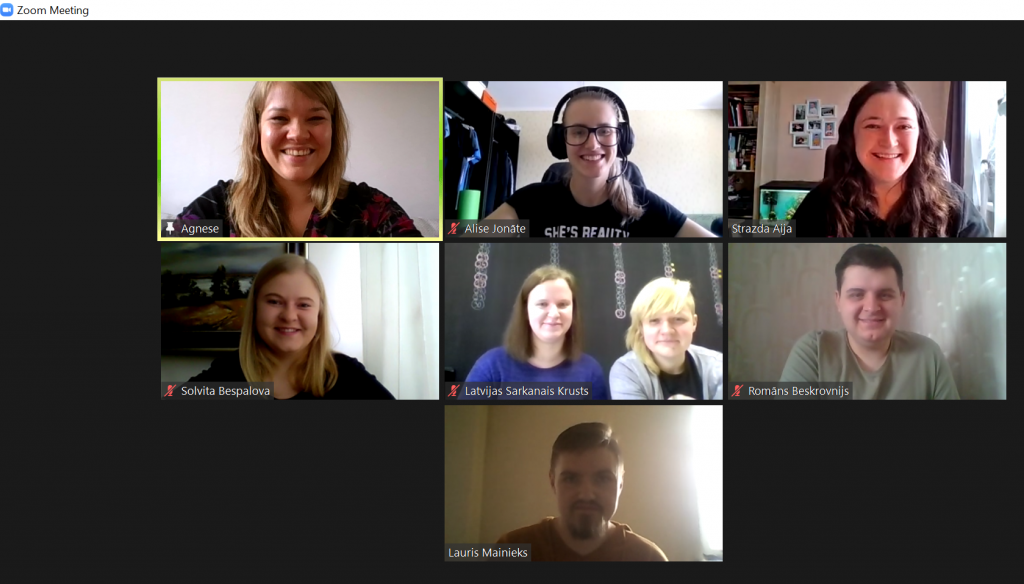
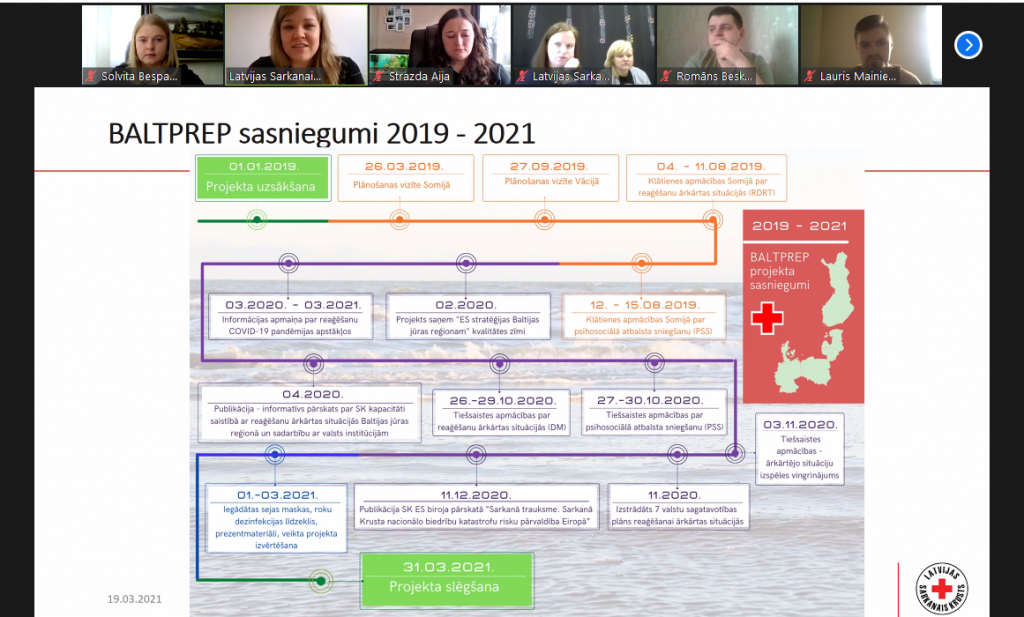
Video: international project “BALTPREP” – experience and benefits
Published on 01.03.2021.
Latvian Red Cross, together with other Red Cross national societies in the Baltic Sea region, has been implementing the project “BALTPREP – enhancing regional preparedness and response capacity for major accidents in the Baltic Sea region” for two years now.
The project is implemented in Finland, Denmark, Germany, Poland, Lithuania, Latvia and Estonia. Civil protection institutions of each country are also involved in the project. Project leaders from each country are sharing experiences and lessons learnt within the project.
The implementation of the international project “BALTPREP” continues in February
Published on 26.02.2021.
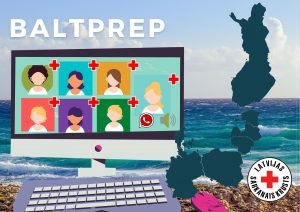
Latvian Red Cross (LatRC) in February, continued to implement the international project “BALTPREP – enhancing regional preparedness and response capacity for major accidents in the Baltic Sea region”. It aims to improve and optimize quality and interoperability of the Red Cross and Civil Protection Authorities regional response capacity for major accidents and severe disruptions.
Taking into account the general COVID-19 pandemic both in Latvia and in the world, the project activities are implemented using online platforms.
In February, several project meetings took place to discuss the project closure period, preparation of documents and reports, as well as project evaluation activities in the “BALTPREP” project member states.
For example, LatRC employees who participated in the international training on psychosocial support in emergencies that was organized by Danish RC in October 2020, gathered together once more in 24th February in order to discussion the organization of online training on psychosocial support. The discussion focused on an evaluation of the training and a brief overview of the methods and activities used in the online training – tools to be used in the future to keep participants motivated to acquire new knowledge. Moreover, on February 25, a LatRC volunteer who had participated in the Table-top exercise few months earlier, shared her view of the gained experience.
Work was also carried out on the final video of the project, in which project leaders from each country share the experience and knowledge gained through the project. It will be available on LatRC communication channels from the beginning of March.
The leaders of the project “BALTPREP” participate in the international project steering group meeting
Published on 27.01.2021.
On 26 January, a meeting of the steering group of the project “BALTPREP – enhancing regional preparedness and response capacity for major accidents in the Baltic Sea region” took place.
Project leaders from each member state discussed and shared their experiences during the project and the plans for the project extension period until March 2021. Also, a renewed disaster preparedness plan was discussed among the group that was led by the German Red Cross representative.
Moreover, project leaders from each country shared their experience of working in the COVID-19 crisis in cooperation with state and municipal authorities.
The SK EU Office has published a report “Red Alert. National Red Cross Societies managing disaster risks in Europe”
Published on 12.11.2020.
Europe is facing a changing climate, and rising risks. Some trends are clear: heat, extreme rainfall, droughts and wildfires are on the rise. Recent events often provide a good lens to understand how risks are evolving. The record heatwaves for instance, which featured among the world’s most deadly disasters, show us not just how the climate is changing, but also how our societies are still unprepared to cope with increasing extreme weather events.
The Red Cross EU office has released the report on disaster management “Red Alert. National Red Cross Societies managing disaster risks in Europe”. In includes an overview about the disaster management and planning processes in Europe. In the chapter “Towards smart preparedness planning in the Baltic Sea region” overview about the disaster preparedness planning processes is found. In addition, it indicates how COVID-19 pandemics has shown that disaster preparedness planning processes should be reviewed considering the cross-border and cross-sectoral threats.
More information about the Baltic Sea region disaster preparedness planning and experience of LatRC and other RC national societies of the region is found HERE (31 – 33 pages).
Since January 2029 LatRC implements the international project “BALTPEP – enhancing regional preparedness and response capacity for major accidents in the Baltic Sea region”. The main goal is to improve and optimize quality and interoperability of the Red Cross and Civil Protection Authorities regional response capacity for major accidents and severe disruptions.
The BALTPEP project is implemented in Finland, Denmark, Germany, Poland, Lithuania, Latvia and Estonia.
In four day training Latvian Red Cross representatives learn about the psychosocial support in disasters
Published on 12.11.2020.
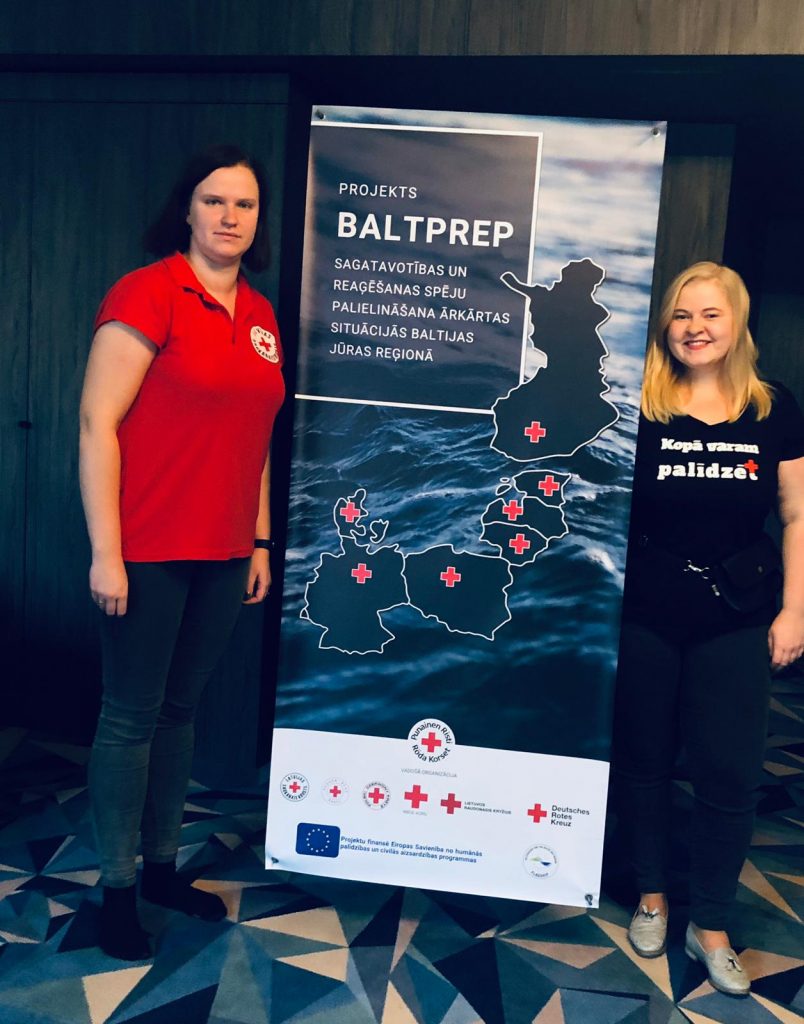 On 27 – 30 October, 2020, within the international project “BALTPREP – enhancing regional preparedness and response capacity for major accidents in the Baltic Sea region” representatives of the Latvian Red Cross joined the Psychosocial support (PSS) specialist training 2020. It was organised by the Danish Red Cross.
On 27 – 30 October, 2020, within the international project “BALTPREP – enhancing regional preparedness and response capacity for major accidents in the Baltic Sea region” representatives of the Latvian Red Cross joined the Psychosocial support (PSS) specialist training 2020. It was organised by the Danish Red Cross.
During four days of training participants from Latvian, Danish, Lithuanian, Estonian, Finnish, Polish and Russian Red Cross national societies studied such topics as auxiliary mandate and role of national societies in the context of disasters, fundamental principles of provision PSS and psychological first aid (PFA) to the citizens in emergency and crisis situations. Participants also learned about Red Cross Tracing Service and its program Restoring Family Links, practical approaches of providing assistance, protection of children, short-term and long-term effects of emergencies on the territory of the country and the region as a whole.
The main focus was to analyse different disaster scenarios by dividing into smaller groups of participants, where everyone had the chance to do role plays and to look for practical approaches of providing help and organising psychosocial support interventions depending on different groups of society – adults, seniors, children, migrants etc.
During the training, the participants learned how to ask relevant questions, arrange them correctly and ask people according to different target groups – not only host community, but also immigrants from other countries, including refugees and asylum seekers. Different ethical aspects were discussed too. Various approaches on how to prepare Red Cross volunteers were discussed, especially those volunteers who would provide psychological and psychosocial assistance to those most in need in emergencies, not only in the volunteer’s home country but also in emergencies in other countries.
This training was special with its practical approach, because every task had to be done by groups by making presentations, drawings, exchanging experiences and sharing opinions.
Reflections of participants:
Evita Semule
“I have to say, that these four days in PSS training definitely were one of the most interesting experience I have ever had. Sometimes when hearing a phrase “online training” people think about boring and tiring video lectures, but it was surprising how well organised, engaging and dynamic PSS training was. It was organised mostly focusing on individual and group work, discussions and practical approaches of learning including role plays with change of appearance and different situation scenarios.
The training was valuable: it gave very important experience and knowledge on how to provide PSS during disaster. Although LatRC experience in providing PSS in disasters in other countries is not that great, topics and advises studied during the training were very actual and have been used during our everyday work, for example in the response of COVID-19 pandemics, provision of First Aid in public events, work with people in need and with children and youngsters. Depending on that, I tried to think about, how we can adapt lessons learnt during the training in our everyday work in future here in Latvia.
One example. Playing a role-play and imagining myself as an old, deaf man (who has suffered the explosion and has taken to a camp set up at school), I immediately visualized the music festivals in Latvia. The main questions for me was, what would we do if we were there and provided first aid, what kind of help we would be ready to provide immediately and how we would be able to include the volunteers and staff members from the nearest LatRC regional branches. The training was certainly very valuable and provided new knowledge and understanding of the provision of psychological support.”
Solvita Bespalova
“This was the first time I joined an international online training about a topic that I am not experience in. Thanks to the professionality and support of organizers, the training was so interesting, valuable, intense and dynamic. At the end of the training, I came to a conclusion that the development of LatRC activities and projects in such topics as PSS and mental health are very crucial. The great RC cooperation network all over the world could be a great support in making new projects, activities, volunteer trainings by attracting PSS and other specialists from other RC national societies, for example, from Denmark, Germany, Finland etc. Thanks for the opportunity to participate in the “BALTPREP” project and this training.”
Project “BALTPREP”: LatRC joins the international disaster management training
Published on 11.11.2020.
On 26 – 20 October, 2020, within the international project “BALTPREP – enhancing regional preparedness and response capacity for major accidents in the Baltic Sea region” representative of the Latvian Red Cross joined the Regional Disaster Management (RDM) training organised by Finnish Red Cross.
During four days of the training together with colleagues from Danish, Polish, Lithuanian, Estonian, Finnish, German and Russian Red Cross (RC) national societies (NS) such topics as Context of the Baltic Sea Region, Red Cross and national risk assessments, lessons learnt from large scale disasters, psychosocial support and others were studied and discussed. Also, participants learned about capacity and preparedness of each RS NS in terms of disasters.
Training also included discussions and exchange of experience regarding the NS collaboration with stakeholders and institutions, attraction of volunteers, preparedness to oil spill accidents and capacity of prevention of consequences.
Participants had opportunity to receive the information about the international experience of volunteer rescuer service as a corporation method in smaller to larger scale accidents.
In the closing day, the focus was a humanitarian aid provision mechanism of International Red Cross and Red Crescent national societies, including bilateral support mechanisms between RS NS in Baltic Sea region.
Participant ‘s reflections
Alise Jonāte
“The training gave an opportunity to learn about the level of disaster preparedness of our and other countries. It was a great possibility to look at real accidents and understand what is the role of Latvian Red Cross in terms of such disasters and what we can learn from them.
The training not only provided an opportunity to make new contacts and exchange experiences, but also to find a common and unified way of communication that is understandable to every member of the team.
To understand how to deal with such situations, it is necessary to understand what resources are available, the capacity of the Red Cross, as well as the situation in neighbouring countries to seek the necessary help if necessary.
Many different factors affect each situation and it is necessary to prepare in time to be able to react and provide the necessary support and assistance.
It is important not only to have resources and knowledge, but also be psychologically ready, as this is one of the most important supports in crisis situations.
This training is a big contribution to the development of each country’s Red Cross, as it allows us to understand both strengths and weaknesses, look for new approaches and look at each situation from a different angle, in order to respond as much as possible to the situation and assistance needed.”
LatRC participates in online training – table top exercise
Published on 04.11.2020.
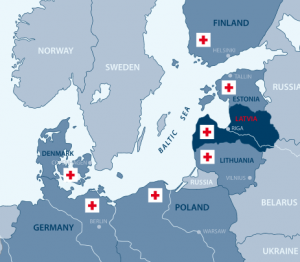
On 3 November, the representatives of the Latvian Red Cross participated in the international online training – table top exercise led by the German Red Cross.The training was organized within the international project “BALTPREP – enhancing regional preparedness and response capacity for major accidents in the Baltic Sea region”. Employees and volunteers of 7 RC national societies as well as representatives of public authorities of several countries joined the training.
An emergency situation was simulated – the ship ran aground in the Baltic Sea in the territory of Lithuania, and it was necessary to evacuate the people and crew on board.
During the training the potential action plan of Lithuanian Red Cross and Lithuanian government was discussed – provision of the immediate help and what are the methods on how to involve international support of the Red Cross national societies and emergency response stakeholders of neighboring countries.
Latvian Red Cross staff members and volunteers are introduced with the actual information on “Balptrep” project
Published on 23.10.2020.
On 8 October, 2020 in Talsi region LatRC staff members and volunteers joined a seminar of representatives of LatRC regional branches, social centres and programs. During the event LatRC activities, services and projects were presented. As one of the recently implemented projects “BALTPREP – Enhancing regional preparedness and response capacity for major accidents in the Baltic Sea region” was presented. The actual information regarding the activities already carried out, results and planned events, like:
- International training on disaster management organised by Finnish Red Cross (26 – 29 October, 2020),
- International training on providing psychosocial support in emergencies organised by Danish Red Cross (27 – 30 October 2020),
- Recently made guidelines of the psychological support and disaster management.
was introduced by Ms Agnese Trofimova, manager of “BALTPREP” project.
Also everyone was welcomed to get acquainted with the Overview of capacity of every country in the Baltic Sea Region.
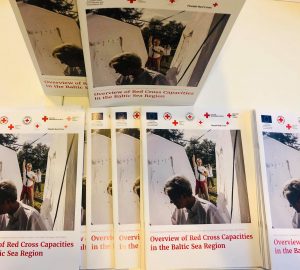
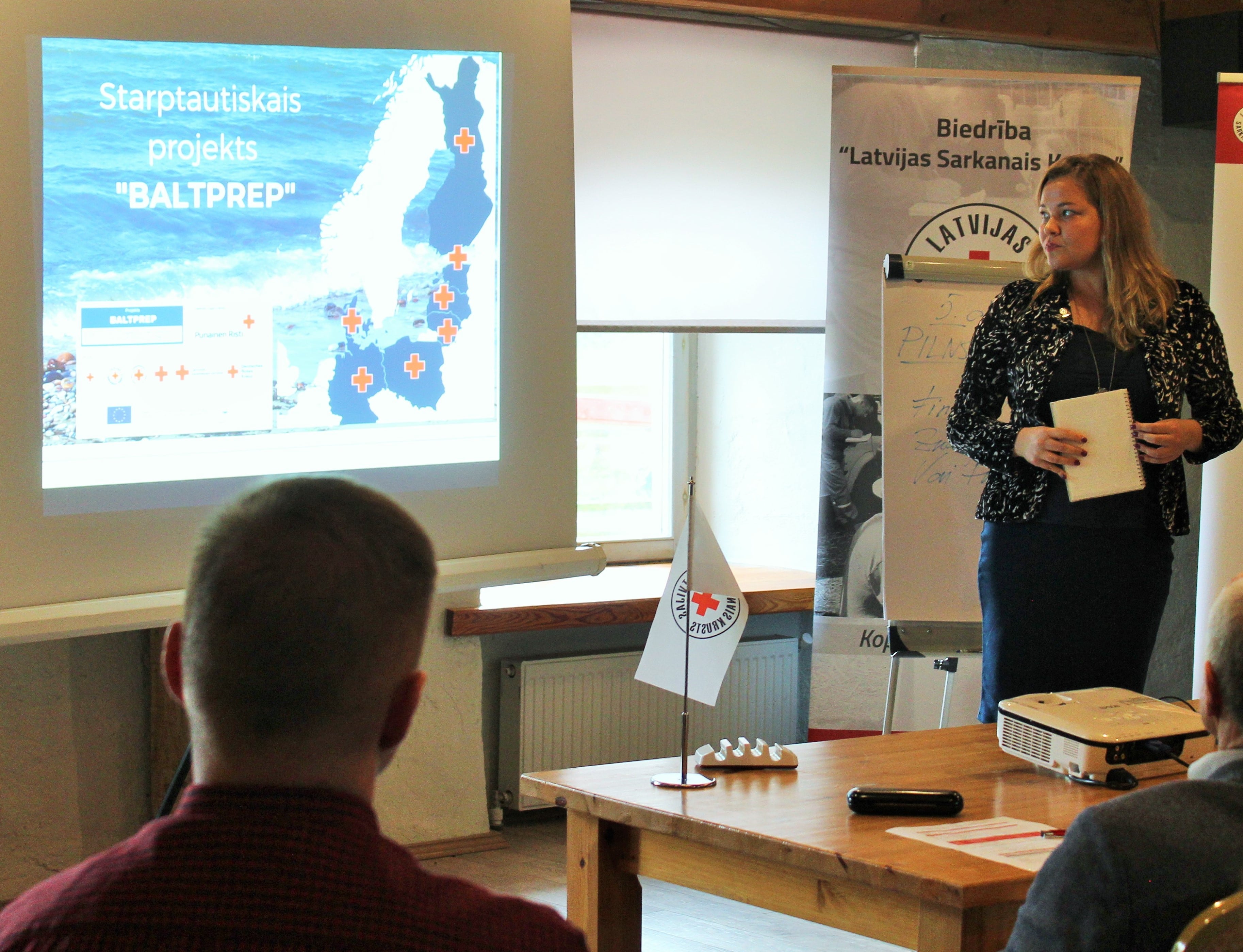
Representatives of the LatRC joins international online meeting within the project “BALTPREP”
Published on 27.08.2020.
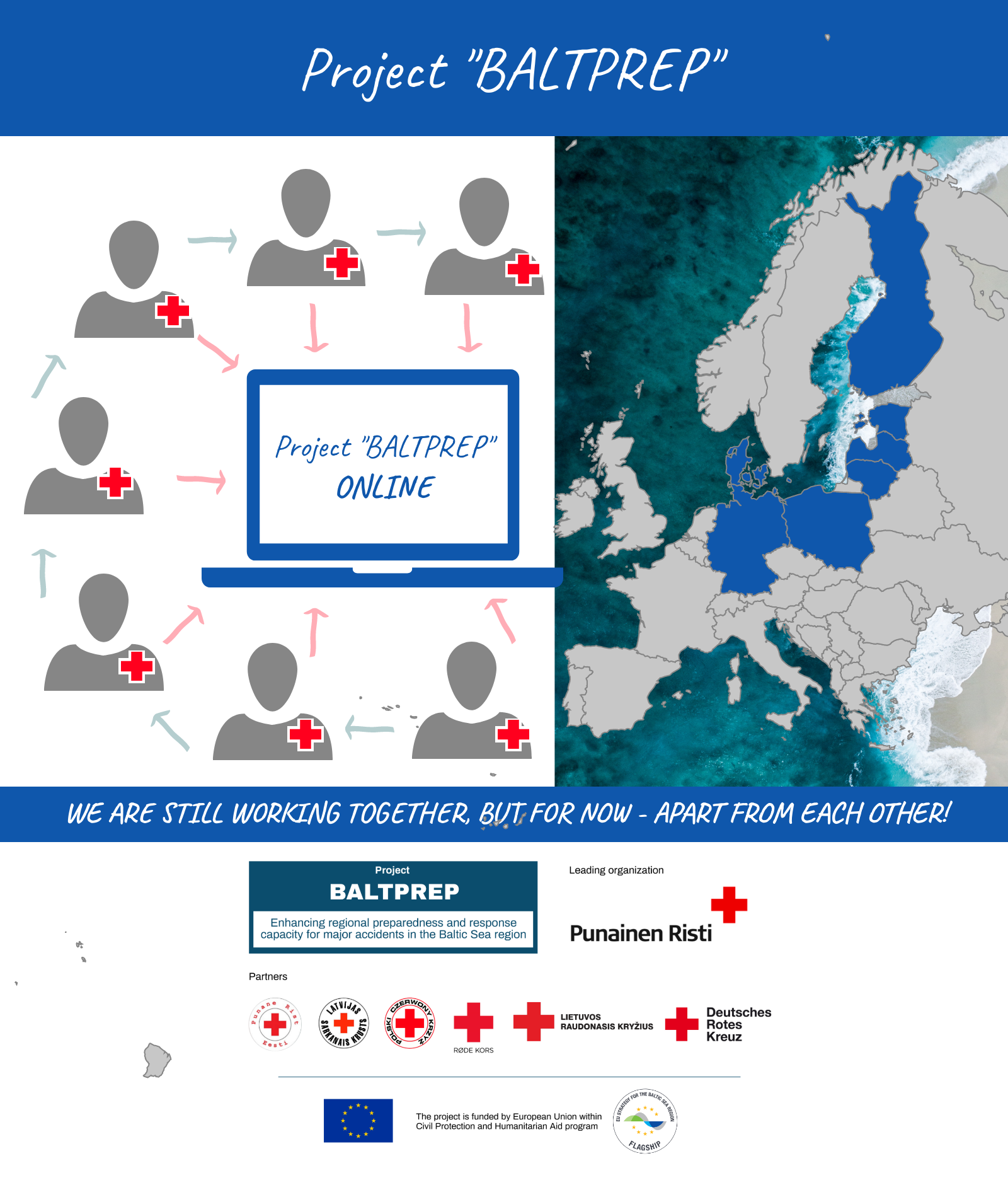
On 21 August the representatives of the Latvian Red Cross who are actively working for the implementation of the international project “BALTPREP – enhancing regional preparedness and response capacity for major accidents in the Baltic Sea region” participated at the online project group meeting together with project partners from other 6 Red Cross national societies in Baltic Sea region.
During the meeting international disaster management and psycho-social support trainings were discussed. According to the project plan, these trainings should have been planned in the end of October in Latvia. However, due to COVID-19 there are still various safety restrictions which have a direct impact on training planning, especially the travel restrictions. Therefore, the project team members decided to organise these trainings online.
The project team agreed to do their best to ensure that the online trainings will be as interactive and engaging as possible for the participants.
LatRC will continue the planning of these trainings in another format, including different kind of approaches – tools, technical support etc. – for working together, at the same time, but being apart from each other physically.
LatRC actively works for the implementation of the international project “BALTPREP”
Published on 16.06.2020.
On 10 and 12 June the representatives of the Latvian Red Cross who are actively working for the implementation of the international project “BALTPREP – enhancing regional preparedness and response capacity for major accidents in the Baltic Sea region” participated at the project group meetings.
The first was a disaster management technical working group meeting of the Baltic Sea region. It was organised to have a platform in order to share international real-time evaluations and learnings from COVID-19 response.
During the second meeting partners discussed the preparedness plan, which will be updated until the end of the project.
Although the emergency situation in Latvia has been cancelled since 9 June, there are still various safety restrictions in Latvia and in other project countries, so the project meetings took place through online communication channels.
Meanwhile LatRC is planning the international disaster management training, which will take place in Latvia in October 2020.
LatRC joins international project “BALTPREP” team meeting online
Published on 21.05.2020.
Although the restrictions of COVID-19 continue, work on the project “BALTPREP – enhancing regional preparedness and response capacity for major accidents in the Baltic Sea region” continues, with the aim to increase the preparedness and response to emergencies in the Baltic Sea Region.
The project team, representing 7 countries, continues to work on the planning of project activities and the implementation of previously set goals, but, while keeping safe, the project team actively communicates through online communication channels.
On May 20, 2020, the representatives of the Latvian Red Cross (LatRC) joined the online meeting, where international emergency response training was planned. A training will be held in Latvia in October 2020.
The meeting included:
the discussion about the location of the training and various related aspects;
the planning of training activities;
discussion about other planned project activities and each Red Cross national society`s domestic response to COVID-19.
Responding to the COVID-19 pandemic in the Baltic Sea Region
Published on 16.04.2020.


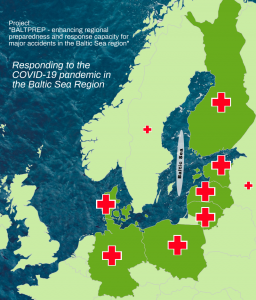 The rapidly spreading COVID-19 pandemic is unprecedented in recent history. It is not only a public health crisis but also a humanitarian crisis that will impact the lives, health and livelihoods of people around the world. In the Baltic Sea region, Red Cross National Societies support national authorities in preparing and responding to the pandemic.
The rapidly spreading COVID-19 pandemic is unprecedented in recent history. It is not only a public health crisis but also a humanitarian crisis that will impact the lives, health and livelihoods of people around the world. In the Baltic Sea region, Red Cross National Societies support national authorities in preparing and responding to the pandemic.
National Societies are sharing experiences
Preparing and responding to the COVID-19 pandemic is a challenging long-term operation to the Red Cross National Societies in the Baltic Sea region. It has special characteristics such as the implementation of Emergency Powers Law and restrictions which also affect the work of the Red Cross.
In the Baltic Sea Region, the Red Cross Societies have an important role in offering psychosocial support and helping the most vulnerable people during this crisis. They also must deal with the important issue of safety of their volunteers. The participating National Societies to the BALTPREP project have been sharing their experiences and insights into the COVID-19 actions. The aim of the project is to enhance region-wide cooperation and capacity in responding to major disasters in the Baltic Sea region. Depending on the country and the situation of the pandemic, National Societies have been engaging in various activities and operations.
In Germany, there has been a steep rise in the number of infections. So far the German Red Cross headquarters has mainly been involved in three operations, commissioned by the federal authorities in the country. The Red Cross volunteers and staff have for example hosted returnees quarantined for 14 days. Catering, leisure activities and psychosocial support were organized for people and their access to medical services was ensured or provided by the Red Cross. Further, German Red Cross branches are helping to organize various activities, such as emergency day care for children, fever check-ups, supporting the testing of people for Covid-19, running or supporting quarantine accommodations and assistance for people in home quarantine.
In Latvia, a state of emergency was declared at the beginning of March. In co-operation with the International Federation of Red Cross and Red Crescent Societies (IFRC) and the World Health Organization, and in response to the recommendations of the Latvian authorities, Latvian Red Cross is providing information about the prevention of getting infected with the virus and what to do if a person has been infected etc. We are also offering support of volunteers who would buy food for people who are in quarantine or isolated, however there are not many requests for it. Latvian Red Cross is providing all the classical services (e.g., home service, all shelter and social centres are running) as those services cannot be done remotely or digitally.
The Latvian Red Cross is actively communicating on prevention, carrying out health promotion activities and supporting people in quarantine.
Estonia is also in state of emergency and the Estonian Red Cross has been working as an auxiliary to the authorities by screening thermal cameras, distributing information materials and providing health counseling, if needed, at Tallinn port passenger terminals and Tallinn Airport during two weeks. The Estonian Red Cross is also supporting local authorities in needs-based support such as food delivery to the elderly living alone, distribution of information materials and other community support aimed at the most vulnerable at branch level. A state of emergency has been declared also in Poland, where the actions of the Polish Red Cross concentrate on the promotion of blood donations by branches on the Internet and social media and continuing the implementation of a food aid programme. The Polish Red Cross provides home care services, and psychosocial support. A psychosocial support helpline is also in place. Webinars are organized especially to engage young volunteers and make them stay at home.
Many restrictions are taking place in Denmark, too. The Danish Red Cross is supporting authorities and carrying out Red Cross stand-alone operations. The auxiliary role includes participating in a call center, where various authorities have come together to activate a hotline for questions around the situation. Volunteers and interested people have been mobilized for this operation. At the call centre, the needs are currently shifting from providing symptoms related information to offering psychological support to those especially worried about the situation. The Danish Red Cross has also established a social online network for people hit by COVID-19, many of whom are already in a vulnerable position. Further, Danish Red Cross volunteers support people in running errands and help to match those who need help with those who want to help. The Danish Red Cross also distributes support packages to prisoners and homeless people and ensures health care and safe/protected quarantine possibilities to undocumented migrants.
In Finland, the state of emergency continues, and the Finnish Red Cross is supporting the most vulnerable groups as requested by the authorities. On request, the Red Cross provides hospitals with Triage units to enhance the capacity to assess people’s need for treatment. Volunteers support elderly and other vulnerable people. Support is offered online and by phone, as volunteers trained in psychosocial support help those troubled by the situation. The Finnish Red Cross Youth Shelters run a chat service for youth in cooperation with two associations. Communication, publishing information on the COVID-19 and sharing messages of the authorities, also play an essential role.
BALTPREP project has strengthened the capacity of the Red Crosses in the Baltic Sea region
The joint project of the Red Cross National Societies of the Baltic Sea Region, BALTPREP, strengthens regional preparedness and response capacity in the Baltic Sea Region. The project has also strengthened the capacity of the National Societies in providing psychosocial support and in management of spontaneous volunteers. This knowledge and learning have proved to be especially useful for the COVID response as the countries have seen a rise in people wanting to help and spontaneously volunteer for the Red Cross. During this extraordinary and difficult time, psychosocial support is also needed widely.
The project has strengthened the cooperation and collaboration between the National Societies and with civil protection authorities in the region, and in this way has facilitated sharing of learning, which is having a positive effect on the response in the different countries.
LatRC joins international project “BALTPREP” team meeting online
Published on 06.04.2020.
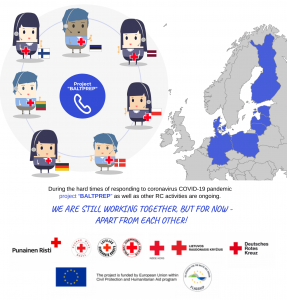 During the hard times of responding to coronavirus COVID-19 pandemic in the World, the Red Cross national societies are continuing to work in providing support to people in need locally and also by working on international projects. One of such projects where activities are ongoing is “BALTPREP” – its goal is to increase the emergency preparedness and response in the Baltic Sea Region.
During the hard times of responding to coronavirus COVID-19 pandemic in the World, the Red Cross national societies are continuing to work in providing support to people in need locally and also by working on international projects. One of such projects where activities are ongoing is “BALTPREP” – its goal is to increase the emergency preparedness and response in the Baltic Sea Region.
The project team continues working on planning the activities and achieving the set goals. But, within the limiting the spread of the COVID-19 and to reduce the risk of infection, project team is planning project activities and events virtually by using available online tools.
In 24 – 25 March, 2020 representatives of the Latvian Red Cross who are participating in “BALTPREP” joined international online project meeting – steering group
During two days, participants discussed:
- Update from each National Society on BALTPREP issues;
- Update from each National Society on response to COVID-19 pandemic;
- Flagship status of project that the European Commission has granted it:
- Next important dates and activities within the project activity plan.
Overview of Red Cross Capacities in the Baltic Sea Region is available
Published on 03.04.2020.
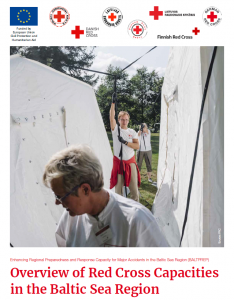 German Red Cross, in collaboration with Project partners, has issued an Overview of Red Cross Capacities in the Baltic Sea Region within the international project “BALTPREP – enhancing regional preparedness and response capacity for major accidents in the Baltic Sea region”.
German Red Cross, in collaboration with Project partners, has issued an Overview of Red Cross Capacities in the Baltic Sea Region within the international project “BALTPREP – enhancing regional preparedness and response capacity for major accidents in the Baltic Sea region”.
This document provides an overview of the capacities of the Red Cross National Societies of the Baltic Sea Region as they currently are. It is hoped that the document will provide an introduction to the Red Cross in the Baltic Sea Region and its capacities and form a basis for a conversation between domestic emergency management agencies, civil protection authorities and Red Cross National Societies as auxiliaries to their governments. All capacities and activities of Red Cross National Societies are summarized tables, to provide a quick overview. Countries are compared based on their resources and activities.
Furthermore, the document includes the description of different profiles about each project “BALTPREP” partner (Finnish, Danish, Estonian, Latvian, Lithuanian, Polish and German RC national societies): general overview, data, activities, programs, especially focusing on preparedness and response skills in major accidents and disasters.
Every reader of an overview has the opportunity to read more about the International Red Cross and Red Crescent movement and to get the understanding why the Movement is so unique.
The document also describes the EU Strategy for Baltic Sea Region (EUSBSR). At the beginning of February 2020 “BALTPREP” has been granted flagship status by the EUSBSR). The flagship status demonstrates the importance of the good work the project has been doing in strengthening the regional response capacity and collaboration between the Red Cross and the civil protection authorities in the Baltic Sea region. More information about the status is found here.
Full version of the overview can be found here:
OVERVIEW OF RED CROSS CAPACITIES IN THE BALTIC SEA REGION
“BALTPREP” has been granted flagship status by the EUSBSR
Published on 27.03.2020.
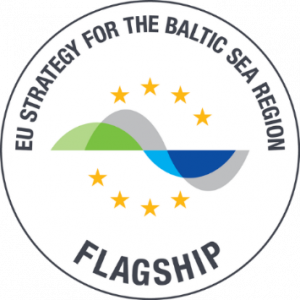
During the hard times of responding to coronavirus COVID-19 pandemic in the World, the Red Cross national societies are continuing to work in providing support to people in need locally and also by working on international projects. One of such projects where activities are ongoing is “BALTPREP” – its goal is to increase the emergency preparedness and response in the Baltic Sea Region.
The project “BALTPREP- enhancing regional preparedness and response capacity for major accidents in the Baltic Sea region” has been granted flagship status by the EU Strategy for Baltic Sea Region (EUSBSR). The decision was made on February, 5 by the National Coordinators of the EU Strategy for EUSBSR. Projects and processes named Flagships of the EUSBSR demonstrate especially well the progress of this EU Strategy.
The flagship status demonstrates the importance of the good work the project has been doing in strengthening the regional response capacity and collaboration between the Red Cross and the civil protection authorities in the Baltic Sea region, explains Eeva Maijala from the Finnish Red Cross. Together with other RC national societies in Baltic Sea region, also Latvian Red Cross is active in participating in this project.
By the end of the project Civil Protection Authorities, communities and the Red Cross National Societies benefit from improved coordination, quality and interoperability of response capacities and more efficient and standardized assistance in case of an emergency.
The EUSBSR is the first Macro-regional Strategy in Europe. The Strategy is an agreement between eight member states of the European Union and the European Commission to strengthen cooperation between the countries bordering the Baltic Sea in order to meet the common challenges and to benefit from common opportunities facing the region.
The Strategy is divided into three objectives, which represent three key challenges: 1) saving the sea, 2) connecting the region and 3) increasing prosperity. Each objective relates to a wide range of policies and has an impact on the other objectives. There are 13 policy areas within the strategy, the BALTREP project being under the project area Secure.
There are no new funding or institutions to support the implementation of this Strategy, as it is based on effective and more coordinated use of existing funding sources, and the promotion of synergies and complementarities. The EUSBSR is implemented in concrete joint projects and processes.
BALTREP gathers Red Cross National Societies from Finland, Estonia, Latvia, Lithuania, Poland, Germany and Denmark to strengthen collaboration and regional preparedness. Russian and Swedish Red Cross Societies also participate in the project activities. The project is funded by the EU Civil Protection Mechanism.
LatRC participates at the international meeting within “BALTPREP” project in Berlin, Germany
Published on 09.10.2019.
On 27 September, 2019, within the international project “BALTPREP – enhancing regional preparedness and response capacity for major accidents in the Baltic Sea region” representative of the Latvian Red Cross (LatRC) joined a project group meeting in Berlin, Germany.
The team was working on preparing a regional preparedness plan. It should be useful and important tool to strengthen the cooperation among the Red Cross national societies in Baltic Sea region.
to The plan will decribe the order of how to organise exchanging information and requesting and receiving help in case of disaster situations and emergencies (or their threats). It will also include guidelines of coordination of response events among Red Cross national societies in Baltics Sea Region.
All Red Cross National Societies working in the Baltic Sea Region were present in the meeting, either in person or online.
The project partners are 7 EU member states in Baltic Sea macro-region: Finnish Red Cross (leading organization), Estonian Red Cross, Latvian Red Cross, Lithuanian Red Cross, Polish Red Cross, German Red Cross, Danish Red Cross.
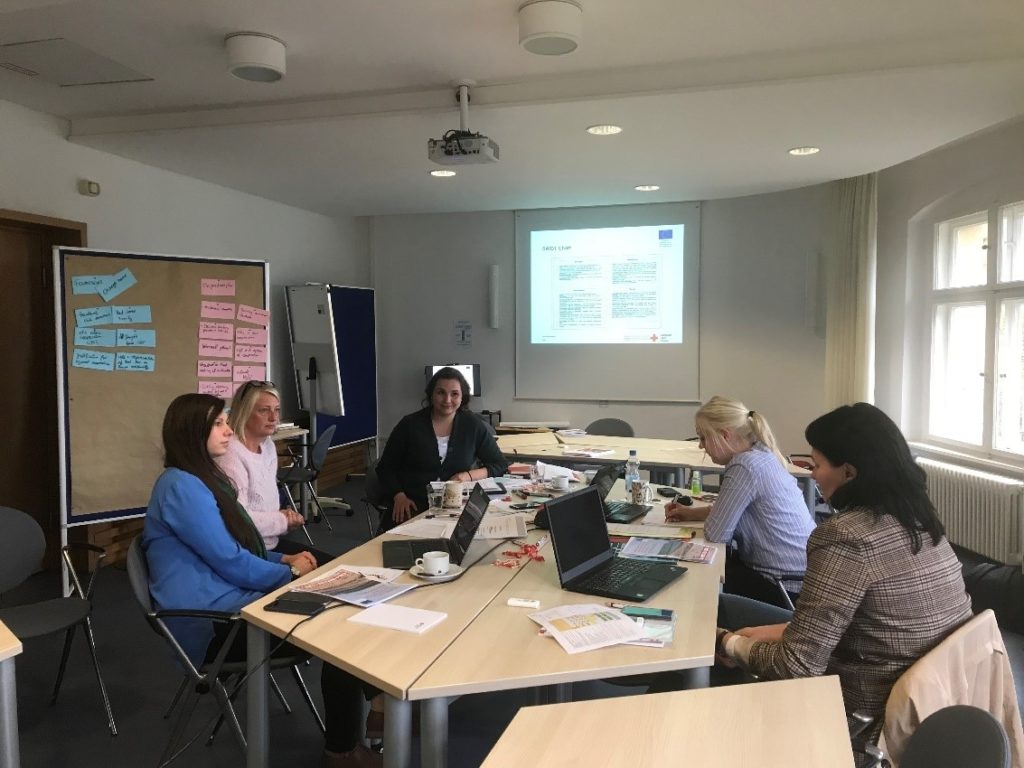
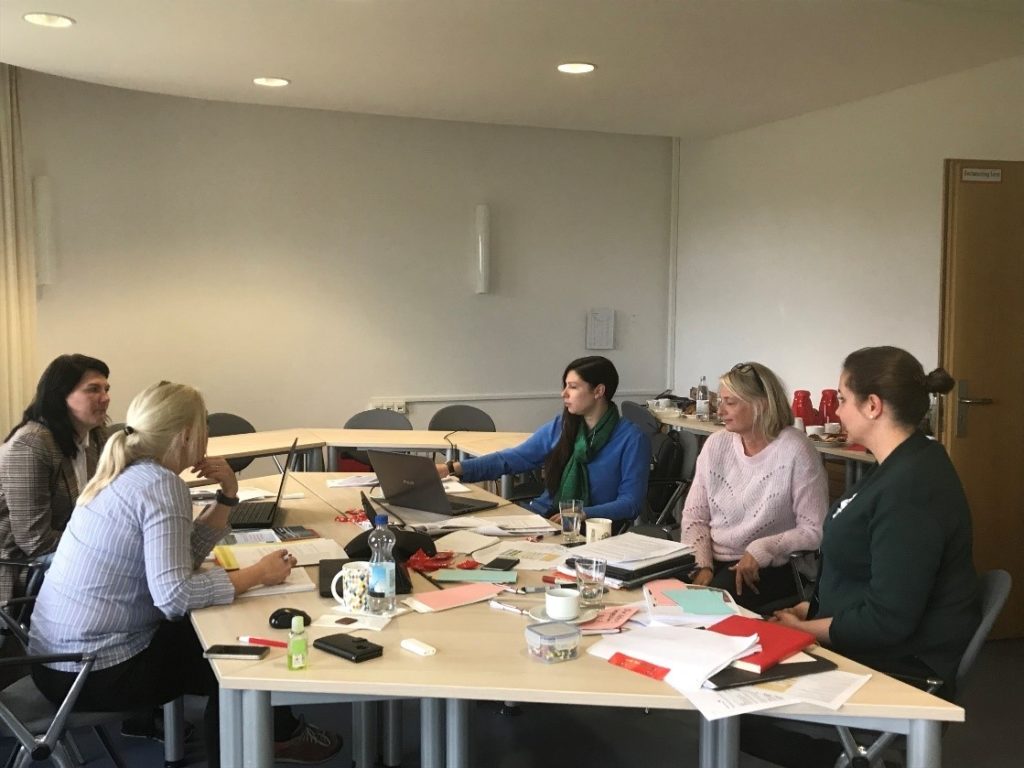
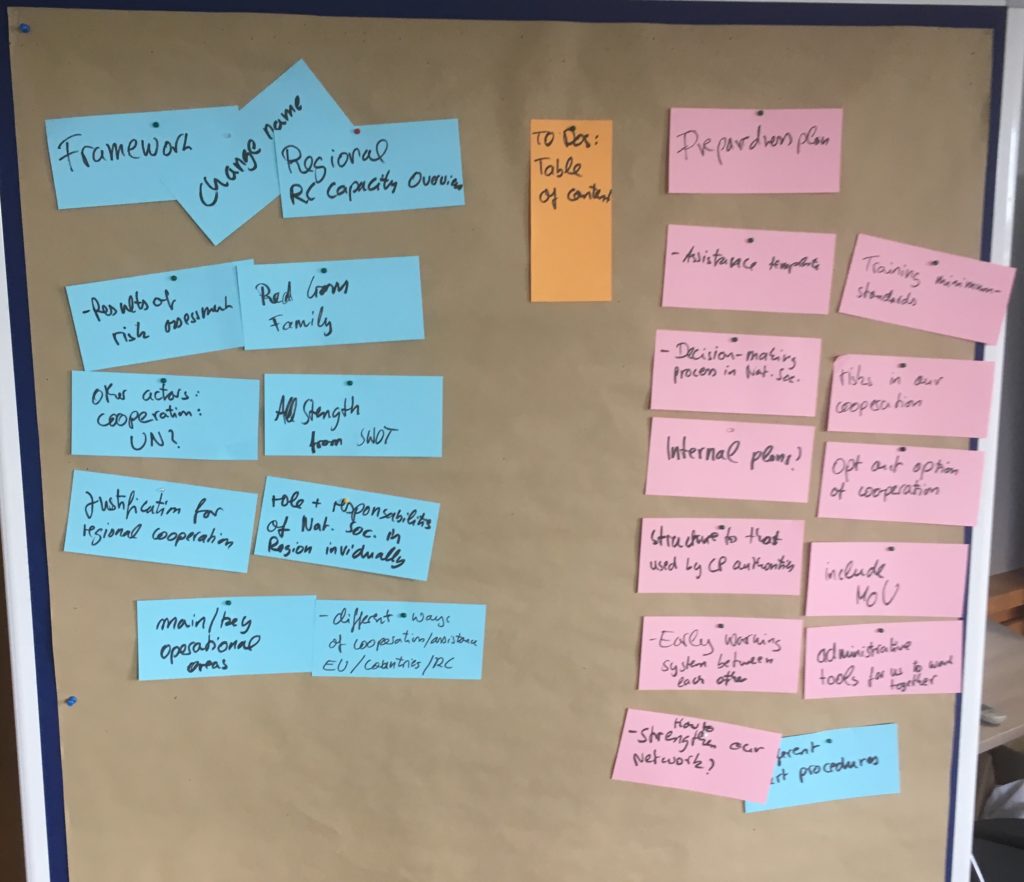
Published on 03.09.2019.
On 4. – 11. August, 2019 within the international project “BALTPREP – enhancing regional preparedness and response capacity for major accidents in the Baltic Sea region” 22 participants from 8 Red Cross National Societies attended the Regional Disaster Response Team training to learn about disaster response in the Baltic Sea region.The training took place in Finland at the Finnish Red Cross Training centre Nynäs in Heinola.
The Regional Disaster Response Teams (RDRT) was designed as IFRC´s globally standardised response tool that can be activated by IFRC after a request from any Red Cross National Society (RCNS) whose national resources and capacities are being stretched. RDRT teams are composed of RCNS staff and volunteers, who assist National Societies in their region, often with the benefit of relevant language skills and a solid cultural and contextual understanding.
This RDRT course was Baltic Sea Region specific. BSR covers a significant area of northern Europe and its EU member countries represent nearly a fifth of the EU population. Over the past few years, issues of preparedness have emerged strongly in the region. The region shares common features and challenges, including similar risks of emergencies and crisis that can have national but also regional implications. An example of such regional disaster was the sinking of the passenger ferry MS Estonia in 1994.
More information about the training please see below in the video.
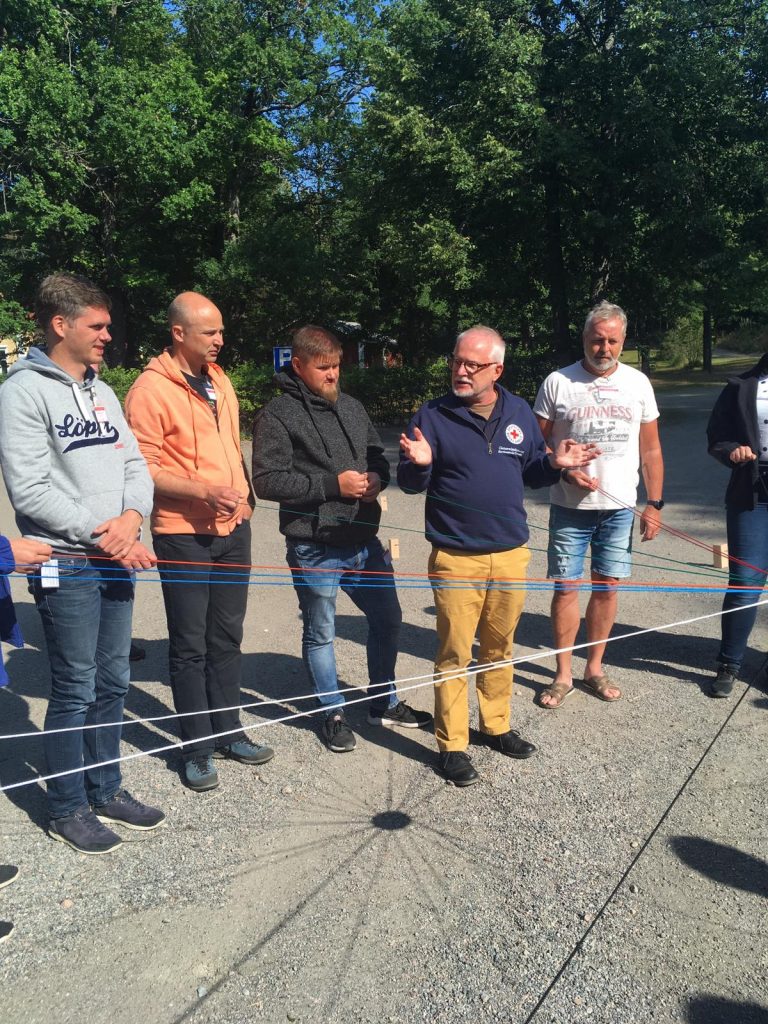

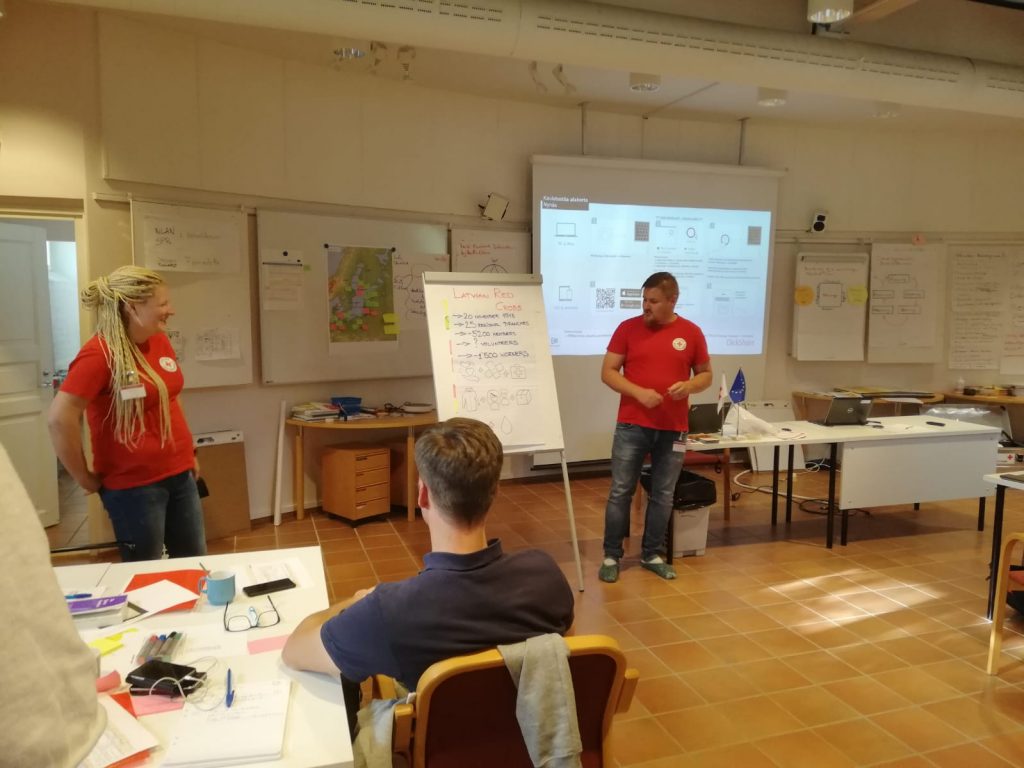
Published on 08.08.2019.
Within the umbrella of the BALTPREP project, the first meeting of a newly established Baltic Sea Region Disaster Management Technical Working Group took place in Helsinki on 7 June, 2019.
The forum is meant for peer learning, exchange of knowledge and support as well as to ensure cooperation of the Baltic Sea region National Societies in the field of disaster management.
All Red Cross National Societies working in the Baltic Sea Region were present in the meeting, either in person or online. This platform will support the regional Red Cross National Societies in exchanging disaster management knowledge and experience.
In the first meeting, the group discussed the current status of cooperation agreements and preparedness plans of the National Societies, paving way for next steps for increased connections to partners in domestic and regional fora.
Project partners, 7 EU member states in Baltic Sea macro-region: Finnish Red Cross (leading organization), Estonian Red Cross, Latvian Red Cross, Lithuanian Red Cross, Polish Red Cross, German Red Cross, Danish Red Cross.

BALTPREP welcomed ideas from key stakeholders in the kick-off event held in Helsinki
Published on 17.04.2019.
On 26 March, 2019, representatives of Latvian Red Cross went to Helsinki, Finland to join project BALTPREP (Enhancing regional preparedness and response capacity for major accidents in the Baltic Sea region) opening event, where project team met with civil protection authorities and other sectoral experts. The guest organizations were Estonian Rescue Centre, Danish Emergency Management Agency DEMA, Finnish Ministry of Interior, Finnish Border Guard, Social Emergency and Crisis Centre, Vantaa and Finnish Federation of the Visually Impaired.BALTPREP team, consisting of seven Baltic Sea region Red Cross national societies, presented their project and discussed issues pertaining to civil protection and regional cooperation with civil protection authorities from Denmark, Estonia and Finland.It makes sense to cooperate more and learn from each other – both domestically and regionally
Civil protection authorities raised the importance of continued information sharing and exhange with civil society. They valued existing joint planning, exercises and training with Red Cross national societies, and saw potential in enhancing the cooperation. For example, the Red Cross national societies could be a potential partner regarding the management of spontaneous volunteers. The support that a volunteer-based organization offers to civil protection authorities was acknowledged, albeit the context differs in the Baltic Sea region from country to country. The legal architecture framing the cooperation, for example, is dissimilar in different countries in the Baltic Sea region. Civil protection authorities’ panel discussion on cooperation with Red Cross National Societies was led by Senior Specialist at the Finnish Ministry of Interior, Jari Honkanen. The participants were Head of section in DEMA Stine Bentien Hundebol, Leading Specialist in Western Rescue Center Eimar Täht from Estonia, and Reetta Voutilainen from Social Emergency and Crisis Centre, Vantaa in Finland. Photo: Finnish Red Cross.
The kick-off event was opened by the Director of International Operations and Programmes of Finnish Red Cross Kalle Löövi who expressed the intent to increase information sharing in the Nordic and Baltic regions. The closing words were given by the Head of International Disaster Management Unit Tiina Saarikoski who noted that the regional work started by BALTPREP will continue also after the project.
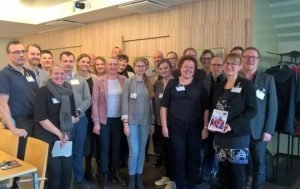

LatRC together with other RC national societies in Baltic Sea Region starts the implemetation of international project BALTPREP
Published on 10.01.2019.
On 1 January 2019 Finnish Red Cross together with the Latvian, Estonian, Lithuanian, Polish, German and Dannish Red Cross national societies started the implematation of the international project “BALTPREP – enhancing regional preparedness and response capacity for major accidents in the Baltic Sea region”
The general objective is to improve and optimize quality and interoperability of the Red Cross and Civil Protection Authorities regional response capacity for major accidents and severe disruptions.
The project is implemented in Finland, Denmark, Germany, Poland, Lithuania, Latvia and Estonia.
The Baltic Sea region (BSR) covers a significant area of northern Europe and its EU member countries representing nearly a fifth of the EU population. Over the past few years, issues of preparedness have emerged strongly in the region. The BALTPREP – Enhancing regional preparedness and response capacity for major accidents in the Baltic Sea region project improves and optimizes quality and interoperability of the Red Cross and Civil Protection Authorities regional response capacity for major accidents and severe disruptions. The project strengthens collaboration in and between 7 EU member states: Finland, Denmark, Germany, Poland, Lithuania, Latvia and Estonia.


